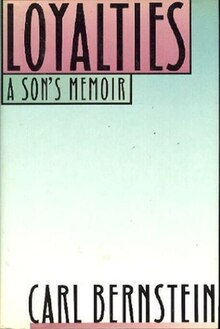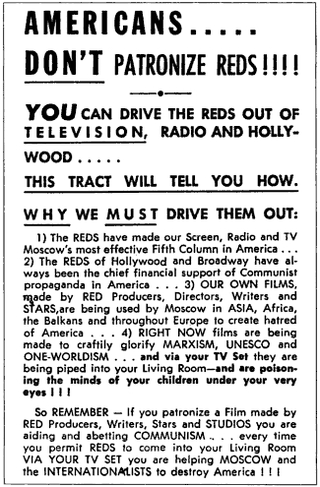
McCarthyism, also known as the Second Red Scare, was the political repression and persecution of left-wing individuals and a campaign spreading fear of alleged communist and Soviet influence on American institutions and of Soviet espionage in the United States during the late 1940s through the 1950s. After the mid-1950s, U.S. Senator Joseph McCarthy, who had spearheaded the campaign, gradually lost his public popularity and credibility after several of his accusations were found to be false. The U.S. Supreme Court under Chief Justice Earl Warren made a series of rulings on civil and political rights that overturned several key laws and legislative directives, and helped bring an end to the Second Red Scare. Historians have suggested since the 1980s that as McCarthy's involvement was less central than that of others, a different and more accurate term should be used instead that more accurately conveys the breadth of the phenomenon, and that the term McCarthyism is, in the modern day, outdated. Ellen Schrecker has suggested that Hooverism, after FBI Head J. Edgar Hoover, is more appropriate.
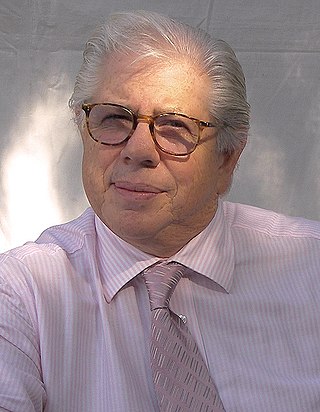
Carl Milton Bernstein is an American investigative journalist and author. While a young reporter for The Washington Post in 1972, Bernstein was teamed up with Bob Woodward, and the two did much of the original news reporting on the Watergate scandal. These scandals led to numerous government investigations and the eventual resignation of President Richard Nixon. The work of Woodward and Bernstein was called "maybe the single greatest reporting effort of all time" by long-time journalism figure Gene Roberts.

The Front is a 1976 American drama film set against the Hollywood blacklist in the 1950s, when artists, writers, directors, and others were rendered unemployable, having been accused of subversive political activities in support of Communism or of being Communists themselves. It was written by Walter Bernstein, directed by Martin Ritt, and stars Woody Allen, Zero Mostel and Michael Murphy.

Elizabeth Terrill Bentley was an American NKVD spymaster, who was recruited from within the Communist Party USA (CPUSA). She served the Soviet Union as the primary handler of multiple highly placed moles within both the United States Federal Government and the Office of Strategic Services from 1938 to 1945. She defected by contacting the Federal Bureau of Investigation (FBI) and debriefing about her espionage activities.

Edward Uhler Condon was an American nuclear physicist, a pioneer in quantum mechanics, and a participant during World War II in the development of radar and, very briefly, of nuclear weapons as part of the Manhattan Project. The Franck–Condon principle and the Slater–Condon rules are co-named after him.
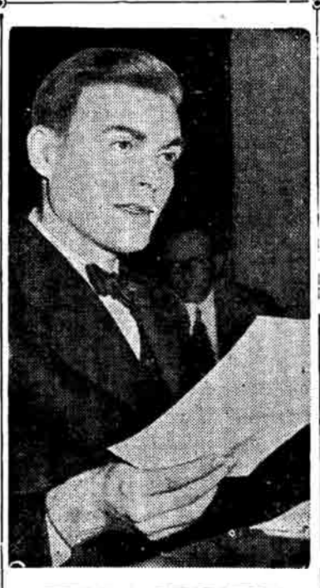
William Walter Remington (1917–1954) was an American economist who was employed in various federal government positions for the United States. His career was interrupted by accusations of espionage made by Elizabeth Bentley, a Soviet spy and defector.
Bartley Crum was an American lawyer who became prominent as a member of the Anglo-American Committee of Inquiry, his book on that experience, and for defending targets of HUAC, particularly the Hollywood Ten and Paul Robeson.

President Harry S. Truman signed United States Executive Order 9835, sometimes known as the "Loyalty Order", on March 21, 1947. The order established the first general loyalty program in the United States, designed to root out communist influence in the U.S. federal government. Truman aimed to rally public opinion behind his Cold War policies with investigations conducted under its authority. He also hoped to quiet right-wing critics who accused Democrats of being soft on communism. At the same time, he advised the Loyalty Review Board to limit the role of the Federal Bureau of Investigation (FBI) to avoid a witch hunt. The program investigated over 3 million government employees, just over 300 of whom were dismissed as security risks.
Athan George Theoharis was an American historian, professor of history at Marquette University in Milwaukee, Wisconsin. As well as his extensive teaching career, he was noteworthy as an expert on the Federal Bureau of Investigation (FBI), J. Edgar Hoover, and U.S. intelligence agencies, having written and edited many books on these and related subjects.
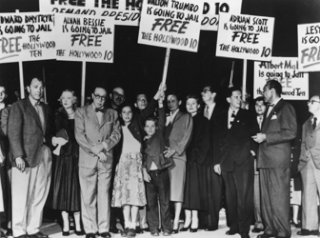
The Hollywood blacklist was an entertainment industry blacklist put in effect in the mid-20th century in the United States during the early years of the Cold War, in Hollywood and elsewhere. Actors, screenwriters, directors, musicians, and other American entertainment professionals were barred from work by the studios.
Entertainer and activist Paul Robeson's political philosophies and outspoken views about domestic and international Communist countries and movements were the subject of great concern to the western mass media and the United States Government, during the Cold War. His views also caused controversy within the ranks of black organizations and the entertainment industry.

The House Committee on Un-American Activities (HCUA), popularly the House Un-American Activities Committee (HUAC), was an investigative committee of the United States House of Representatives, created in 1938 to investigate alleged disloyalty and subversive activities on the part of private citizens, public employees, and those organizations suspected of having communist ties. It became a standing (permanent) committee in 1946, and from 1969 onwards it was known as the House Committee on Internal Security. When the House abolished the committee in 1975, its functions were transferred to the House Judiciary Committee.
The US congressional testimony by Jackie Robinson, the first African-American Major League Baseball player of the modern era, against the famous entertainer and international civil rights activist Paul Robeson, was an American Cold War incident. Its events were precipitated when, at an international student peace conference held in Paris on April 20, 1949, Robeson allegedly made a speech to the effect that African Americans would not support the United States in a war with the Soviet Union, due to continued second-class citizen status under United States law. This subsequent controversy caused the House Committee on Un-American Activities (HUAC) to investigate Robeson and Robinson, as a famed African-American baseball player, was called on to impugn Robeson.
Joseph Forer was a 20th-century American attorney who, with partner David Rein, supported Progressive causes, including discriminated communists and African-Americans. Forer was one of the founders of the National Lawyers Guild and its DC chapter. He was also an expert in the "Lost Laws" of Washington, DC, enacted in 1872–1873, that outlawed segregation at business places.
George Shaw Wheeler was an American economist and advisor to President Franklin Delano Roosevelt, best known for being the first American to defect over the Iron Curtain to Czechoslovakia in November 1947.
Sylvia Bernstein was an American civil rights activist.
Alfred David Bernstein was an American civil rights and union activist.
David Rein (1914–1979) was a 20th-Century American attorney who, with partner Joseph Forer, supported Progressive causes including the legal defense of African-Americans and accused Communists. Rein and Foyer were members of the National Lawyers Guild and its D.C. chapter. Rein represented "more than 100 people", alleged to have been Communists, before the House Un-American Activities Committee (HUAC) and the subcommittee of the Senate Committee on Administration.
Abram Flaxer (1904-1989) was an American union leader who founded the State, County, and Municipal Workers of America (SCMWA), which merged with the United Federal Workers of America (UFWA) to form the United Federal Workers of America (UFWA), of which he became president.
Defending Rights & Dissent (DRAD) is a national not-for-profit advocacy organization in the United States, dedicated to defending civil liberties, exposing government repression, and protecting the right of political dissent. DRAD was formed as the merger of the Defending Dissent Foundation (DDF) and the Bill of Rights Defense Committee (BORDC). DRAD is currently active in defending the right to protest, opposing political surveillance, and campaigning against the prosecution of national security whistleblowers.
